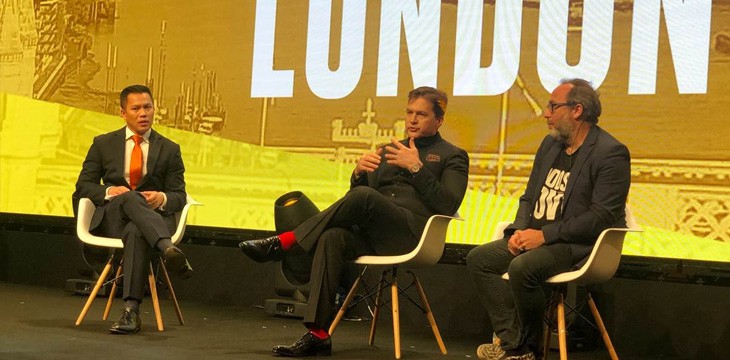|
Getting your Trinity Audio player ready...
|
https://youtu.be/U0dg3EusM8Y
Wikipedia founder Jimmy Wales said he’s not ideologically opposed to Bitcoin, but doesn’t see any compelling reasons to use it right now. Joining Dr. Craig Wright in an on-stage conversation at CoinGeek London, Wales presented a counter narrative to Bitcoiners’ enthusiasm and presented some reasons why it hasn’t taken the world by storm as much as some would like.
Crowd was expecting something more fiery
Wales’ baptism into the Bitcoin BSV world was a fiery one—in the lead-up to CoinGeek London he made it clear he was not an advocate for using Bitcoin on Wikipedia, and didn’t think there was a use case for it there. For these views, he became embroiled in long Twitter arguments with BSV fans and some were expecting a more confrontational appearance.
However it wasn’t to be. Dr. Wright and Wales engaged in a short but rational discussion about the merits and potential uses for Bitcoin and an immutable ledger for an organization like Wikipedia. There wasn’t much disagreement on either side, but it was evident Bitcoiners would need to (a) become far more numerous, or (b) devise some more compelling use-cases before Wales would look at Bitcoin again.

What was clear from the discussion was that no one’s really sure how Wikipedia should use Bitcoin right now. Should it be for voluntary donations? Should readers make micropayments to read articles, or incentivize further research on their preferred topics of interest? Would an immutable ledger provide any benefit over the systems Wikipedia currently uses?
Wales doesn’t seem to think so. Giving the example he’d already provided on Twitter, he said Wikipedia’s database model already provides transparency by recording every edit made and the identity of the person who made it. The organization already has the power to remove (and permanently delete) any information that is abusive or illegal, like child pornography. Moreover, he said there’s no threat of articles secretly disappearing from the platform without a trace, so that isn’t a problem.
There are “lots of downsides but not many potential upsides” to trying new data management models like blockchain, he added, and “we haven’t seen anything that would make that worthwhile.”
Some problems, but no perfect solution
Both Wright and Wales seemed to agree that biased presentation was a problem on Wikipedia. While there’s no ideal solution to that problem in any network made of humans, Wales said, he thinks open discussion is still the best way to handle that problem.
“It’s something we don’t really have well, on the internet … I think Twitter is quite toxic,” Wales said, to cheers from the crowd. “It’s too easy to have throwaway troll accounts; to target someone for harassment; to instantly gain lots of followers.” Wikipedia is always working to find and remove paid/shill editors from its platform, something that happens often.
It would have to be a really compelling reason to move to something else, Wales said. “There are super interesting use cases in other places,” he added, “but we don’t see a need to put any data on the blockchain.”

Dr. Wright said that, as an academic, he’d like to see some things improve on Wikipedia. (His own Wikipedia entry is notoriously inaccurate, and often subject to vandalism and misleading edits.)
His personal preference was for a micropayments model, where readers paid a tiny (under one cent) amount to access a page, or could donate to editors to conduct further research on a preferred topic.
Wales seemed reluctant to interfere with Wikipedia’s current incentive model, saying that pages were created and edited by those genuinely interested in the topics. Paying editors to write on certain topics would only encourage those with enough money to pay for advocacy, to attempt it.
Donate to Wikipedia in Bitcoin?
On the topic of Wikipedia accepting Bitcoin for its donation campaigns, Wales said he wasn’t opposed to the idea per se, but there hadn’t been enough demand for it in the past.
Wikipedia had flirted with the idea by accepting Bitcoin (meaning BTC) donations in the past, he said. However they found overall donations actually decreased as a result—people would see the Bitcoin option on the donation page, become curious, and leave the page to research Bitcoin instead.
Moderator Jimmy Nguyen suggested the reason for the lack of demand was likely BTC’s low capacity and high transaction fees, which made micropayments unfeasible. He put a proposal to Wales that he reconsider accepting Bitcoin in a few years’ time.
“I’d be quite happy just to see Bitcoin donations to Wikipedia,” said Dr. Wright. “I don’t want to dictate to him how to run his platform, I just want to make it easier to give him money.”
Wales said it’s not ideological as far as he was concerned, he just preferred to keep things simple. At present, that means using only payment methods most people were familiar with.
He concluded with perhaps his strongest criticism of blockchain advocates, saying they often suffer from the “if all you have is a hammer, everything looks like a nail” problem. Using blockchain doesn’t automatically make a bad idea good, he said.
In the end, it may become a natural progression. If the Metanet becomes widely-used and preferred as a more honest and truthful internet over time, Wikipedia would naturally migrate to such a network. It wouldn’t be a matter of choosing to “accept Bitcoin” or not.

 02-20-2026
02-20-2026 




